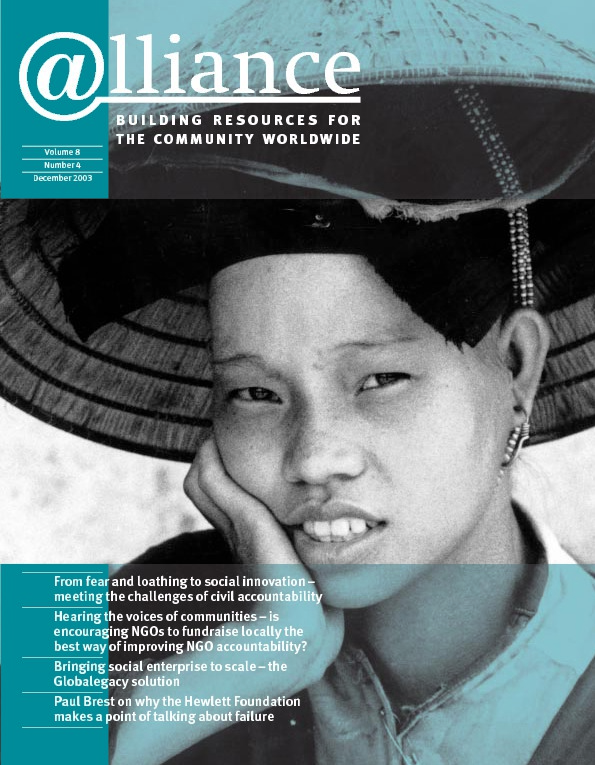For eight Central and Eastern European (CEE) countries, 2003 was a year of popular votes on EU accession.[1] A series of referendums presented a formidable challenge to governments and civil society. In most cases, if results were to be binding, they had to have not only a majority of votes in support of EU membership but also a majority of citizens participating.
Governments of several candidate countries, including Slovakia, therefore decided to tap into the capacity of the civic sector to mobilize the public. This was not the first time that Slovak NGOs had mobilized citizens to vote: it happened in 1998 and 2002. What was different in 2003 was that the funding for these efforts came from government rather than foreign donors.
Slovak NGOs have demonstrated a remarkable ability to mobilize citizens at large. It first became apparent in 1998 when, through the Civic Campaign OK ’98, civil society successfully challenged a government that had jeopardized democracy and isolated Slovakia, then helped avert its return to power in a comparable campaign in 2002.[2] On both occasions, civil society involvement was crucial to reasserting Slovakia’s democratic development, which ultimately led to its invitation to join NATO and the EU in 2004.
These initiatives arose from the concerns of civic actors about democracy in Slovakia. Elections were in peril, victim to government manipulation and widespread public apathy. In response, numerous civic groups distributed election-related information widely, encouraged citizens to vote, and monitored media coverage and the course of the elections. These multifaceted activities were, although political in relevance, strictly non-partisan in nature. Pre-election projects in both years were primarily funded by foreign donors, including private foundations, European institutions and several embassies.
The success of the two campaigns was reflected in the considerable turnout they helped to generate.[3] This would have been unthinkable had NGOs not developed effective techniques to address and mobilize the public. Given this expertise, it was logical that the government should turn to NGOs when facing an uncertain turnout in the 2003 EU referendum. Involving civic organizations in a pre-referendum campaign consequently became part of the government’s strategy for securing Slovakia’s accession to the EU,[4] which, together with NATO membership, is the government’s central foreign policy goal. Unlike the previous occasions, the primary impulse behind the 2003 pre-referendum campaign lay with government.
Government-NGO cooperation
In designing and implementing the campaign, government closely cooperated with NGO representatives. A mixed committee drafted the request for proposals, reviewed funding applications and selected 73 projects for financial support. This joint approach contrasts with earlier pre-election activities, which were purely civic in nature. Rather than engaging foreign donors, the pre-referendum campaign also became the first such project in which Slovak civil society could rely on domestic public funds. The government earmarked $360,000 to be disbursed as small grants for referendum-related NGO projects.
A clear message: Ano – Yes
Projects were eligible for support if they aimed to increase the knowledge of specific social groups on EU matters and to motivate participation in the referendum. Most projects selected combined these objectives with clear advocacy for EU membership, thus taking the campaign beyond simply increasing voter information and participation.
As a result of the collaboration between government and civil society, 52.2 per cent of Slovaks cast their votes on referendum day, with an overwhelming 92.5 per cent supporting EU accession. It is hard to assess the precise extent to which the campaign contributed to this double majority, but it seems beyond doubt that without this joint effort, the Slovak referendum would have fallen short of the required turnout – a scenario with unforeseeable consequences.
In helping to pave the way for EU accession, Slovak civil society once again demonstrated its remarkable capacity for democratic mobilization. It illustrated the increasingly cooperative nature of government-NGO relationships in Slovakia, contrasting starkly with the confrontational character of the 1990s. Similar forms of joint advocacy emerged in several CEE countries and helped the region to pass the 2003 Eurotest with flying colours. With this last hurdle overcome, a larger EU will become a reality in May 2004.
1 Between March and September 2003, successful referendums on EU membership were held in Slovenia, Hungary, Lithuania, Slovakia, Poland, the Czech Republic, Estonia and Latvia. For detailed information, see http://www.ifes.org/eguide
2 See Pavol Demes, ‘From ugly duckling to beautiful swan,’ Alliance, Vol 7, No 4, December 2002, p4.
3 Turnout reached a spectacular 84 per cent in 1998 and a still considerable 70 per cent in 2002.
4 An information campaign on NATO membership introduced this form of government-NGO cooperation in 2002. This can be considered a successful test run for the pre-EU referendum campaign this year.
Pavol Demes is Director for Central and Eastern Europe, German Marshall Fund of the United States, and Joerg Forbrig is a programme associate at GMF’s Bratislava office. They can be contacted at pdemes@gmfus.org and jforbrig@gmfus.org, respectively.




Comments (0)